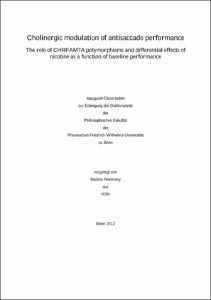Cholinergic modulation of antisaccade performanceThe role of CHRFAM7A polymorphisms and differential effects of nicotine as a function of baseline performance

Cholinergic modulation of antisaccade performance
The role of CHRFAM7A polymorphisms and differential effects of nicotine as a function of baseline performance

| dc.contributor.advisor | Wagner, Michael | |
| dc.contributor.author | Petrovsky, Nadine | |
| dc.date.accessioned | 2020-04-17T17:32:22Z | |
| dc.date.available | 2020-04-17T17:32:22Z | |
| dc.date.issued | 21.06.2012 | |
| dc.identifier.uri | https://hdl.handle.net/20.500.11811/5225 | |
| dc.description.abstract | Objectives. The cognitive domain that is most consistently improved by smoking and nicotine application is attentional performance. However, there are still a number of unanswered questions concerning the possible procognitive effects of nicotine and nicotine-like substances on executive functioning. Moreover, more insight is needed into what predicts the effectiveness of cholinergic treatment. Therefore, in the present investigations the antisaccade task, a paradigm of executive control, was chosen to examine cholinergic effects. Methods. The aim of the first study, the genetic study, was to investigate whether genetic polymorphisms in the cholinergic system, the CHRFAM7A copy number and 2bp deletion polymorphisms, were associated with antisaccade performance. The second study, the nicotine study, tested the hypothesis that baseline performance level may be a behavioral predictor of the effects of nicotine on antisaccade performance. Results. In the genetic study no significant associations were observed of 2-bp deletion or CHRFAM7A copy number with antisaccade performance. The nicotine study demonstrated that the administration of nicotine enhanced antisaccade performance in low-performing subjects, whereas it had no effect in high-performing subjects. Conclusions. The failure to observe an association between antisaccade performance and polymorphisms in the CHRFAM7A gene in the genetic study provides evidence of the specificity of the effects of the CHRFAM7A gene on hippocampal and memory functions. The results from the nicotine study suggest that stimulation of the nicotinic acetylcholine receptor (nAChR) system might be an effective way of improving executive functioning in people with poor baseline performance, such as patients with dementia, ADHD, or schizophrenia. | en |
| dc.description.abstract | Cholinerge Modulation der Antisakkadenleistung: Die Bedeutung von CHRFAM7A-Polymorphismen und differentielle Effekte von Nikotin in Abhängigkeit vom Ausgangsleistungsniveau Einleitung. Aufmerksamkeit ist die kognitive Domäne, für die bisher am konsistentesten gezeigt wurde, dass Nikotin eine leistungssteigernde Wirkung hat. Unklar ist bisher, ob Nikotin auch prokognitive Wirkungen auf sogenannte Exekutivfunktionen hat. Bisherige Studien haben außerdem die Bedeutung von interindividuellen Unterschieden bezüglich der Reaktivität auf eine cholinerge Stimulation weitestgehend vernachlässigt. Daher wurde in der vorliegenden Arbeit die Antisakkadenaufgabe, die ein Paradigma zur Testung der Exekutivfunktion darstellt, ausgewählt, um mögliche cholinerge Effekte zu untersuchen. Methode. Zwei Forschungsstrategien wurden verfolgt: ein molekulargenetischer Ansatz, bei dem untersucht wurde, ob Polymorphismen im CHRFAM7A-Gen interindividuelle Varianz in der Antisakkadenleistung erklären können, sowie ein verhaltensexperimenteller und pharmakologischer Ansatz, bei dem geprüft wurde, ob interindividuelle Unterschiede im anfänglichen Antisakkadenleistungsniveau die Reaktion auf eine cholinerge Stimulation durch Nikotin beeinflussen. Ergebnisse. In der Genetik-Studie fanden sich keine signifikanten Assoziationen zwischen den CHRFAM7A Genkopien-/2-bp-Deletionspolymorphismen und der Antisakkadenleistung. Die Nikotinstudie zeigte, dass Nikotin die Antisakkadenleistung bei Probanden mit einem niedrigen Ausgangsleistungsniveau verbessert, hingegen hatte Nikotin bei Probanden mit einem hohen Ausgangsleistungsniveau keinen Effekt. Schlussfolgerung. Der fehlende Effekt der CHRFAM7A-Polymorphismen auf die Antisakkadenleistung in der Genetikstudie könnte ein Hinweis darauf sein, dass diese Polymorphismen lediglich spezifische Effekte auf durch den Hippocampus vermittelte kognitive Funktionen haben. Die Ergebnisse der Nikotinstudie zeigen, dass die Stimulation des nikotinischen Acetylcholinrezeptor (nAChR)-Systems eine effektive Möglichkeit darstellen könnte, um die Exekutivfunktionen bei Probanden mit einer schlechten Ausgangsleistung zu verbessern, wie zum Beispiel bei Patienten mit Schizophrenie, Demenz oder Aufmerksamkeitsdefizit-/Hyperaktivitätsstörung (ADHS). | en |
| dc.language.iso | eng | |
| dc.rights | In Copyright | |
| dc.rights.uri | http://rightsstatements.org/vocab/InC/1.0/ | |
| dc.subject | Nikotin | |
| dc.subject | Acetylcholin | |
| dc.subject | Antisakkade | |
| dc.subject | Exekutivfunktion | |
| dc.subject | Aufmerksamkeit | |
| dc.subject | nicotine | |
| dc.subject | acetylcholine | |
| dc.subject | antisaccade | |
| dc.subject | executive function | |
| dc.subject | attention | |
| dc.subject.ddc | 150 Psychologie | |
| dc.title | Cholinergic modulation of antisaccade performance | |
| dc.title.alternative | The role of CHRFAM7A polymorphisms and differential effects of nicotine as a function of baseline performance | |
| dc.type | Dissertation oder Habilitation | |
| dc.publisher.name | Universitäts- und Landesbibliothek Bonn | |
| dc.publisher.location | Bonn | |
| dc.rights.accessRights | openAccess | |
| dc.identifier.urn | https://nbn-resolving.org/urn:nbn:de:hbz:5-28182 | |
| ulbbn.pubtype | Erstveröffentlichung | |
| ulbbnediss.affiliation.name | Rheinische Friedrich-Wilhelms-Universität Bonn | |
| ulbbnediss.affiliation.location | Bonn | |
| ulbbnediss.thesis.level | Dissertation | |
| ulbbnediss.dissID | 2818 | |
| ulbbnediss.date.accepted | 22.02.2012 | |
| ulbbnediss.fakultaet | Philosophische Fakultät | |
| dc.contributor.coReferee | Reuter, Martin |
Files in this item
This item appears in the following Collection(s)
-
E-Dissertationen (699)




